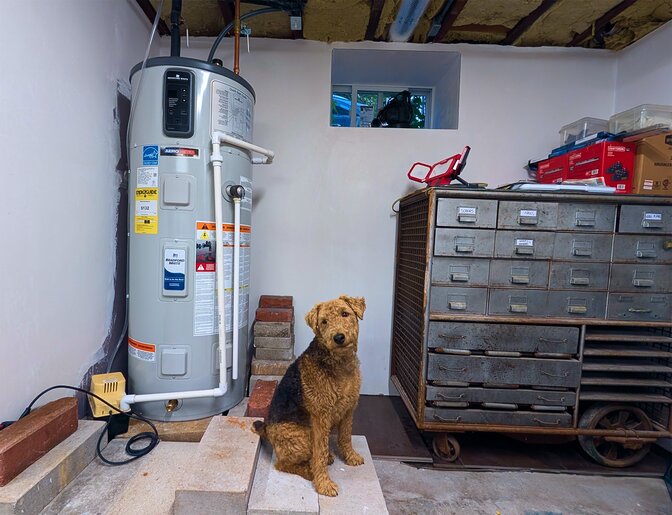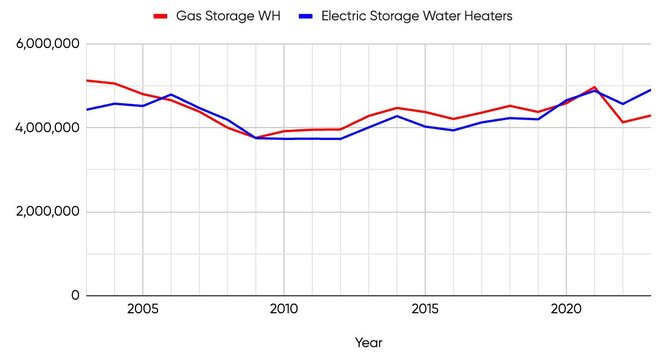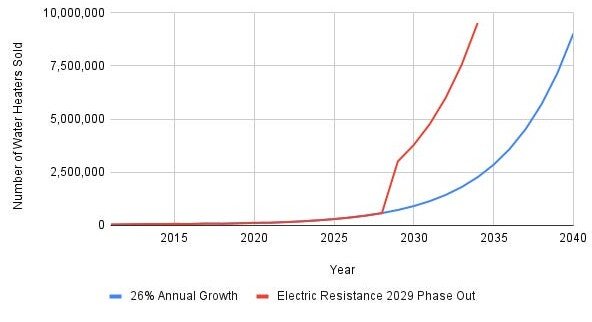Years and years of living within the same four walls can lead a homeowner to take for granted the comforts and conveniences provided by complex systems like water heaters and home heating equipment. We all come to expect the indoor temperature to be just right, hot water ready on demand, and new appliances to work seamlessly when plugged in.
Inevitably, there comes a time for every homeowner when an unexpected event forces them to come to grips with how their home works on the inside. For me, that moment came on a chilly Saturday morning at the tail end of a New England winter when I woke up to a house with no hot water.
A quick check confirmed that all the hot water pipes had indeed been drained empty. “Ah! The basement,” I pondered aloud to Enee, my Welsh Terrier, as I faced the inevitable journey downstairs. Enee barked eagerly, leading the way into the mysterious depths of the house – the basement, his favorite playground.

André’s new heat pump water heater, installed after his old gas unit failed, now provides steady hot water – and a curious basement companion, Enee, approves of the upgrade.
Heat pump water heaters work for emergency replacement
As I began to make my way downstairs, I could see the edge of a 50-gallon puddle of water stretching over the basement floor – a sure sign my old gas water heater had failed. A quick internet search on emergency water heater replacement guided me through the immediate next steps: Cut off the gas, water, and power supply to the unit, check the pressure release and drain valves, and find the leak. It came from the bottom of the tank, likely indicating a crack. I would need a brand new water heater once I was done cleaning up the mess.
As someone who spends working hours educating homeowners on electrification, this was a clear opportunity to put my money where my mouth was. I decided to make the switch to a modern, energy efficient heat pump water heater (HPWH) and reduce my reliance on burning fossil fuel to make energy in my home. Home electrification often happens one appliance at a time, and the next in line would be my deceased gas water heater with a cracked tank that left me and Enee with our toes (and paws) submerged in two inches of cold water.
The most efficient way to heat water
The heat pump water heater is an ingenious device, and one of the most energy efficient water heating systems available today. It uses energy to source heat from the surrounding air by using a compressor and a refrigerant system. Humans have been making fire to heat water for thousands of years, but we now have the technology to extract residual heat from a cold and damp environment such as a basement, and deposit that heat into a pressurized tank that supplies hot water to the entire home at any time of the day or night. Think about that for a minute: Steaming hot showers are made possible by using the heat already in your basement. If we were to drop this concept on someone from a couple of centuries ago, it would blow their minds.
Not only that, but the amount of heat energy that a HPWH can extract is three to four times higher than the energy it consumes. The uniform energy factor (UEF) measures the units of heat energy that the water heater can transfer into the water tank for every unit of energy consumed from the electrical grid or the gas network. My new water heater has a UEF of 3.44, compared to between 0.63 and 0.93 for gas water heaters. That is a remarkably energy efficient solution for water heating, especially when compared to gas water heaters. HPWHs can significantly reduce the energy demands for the second-highest utility expense in a typical home – water heating.
The water heater market in the United States is roughly split between gas and electric water heaters, with a steady climb in electric since 2017. There are two kinds of electric water heaters. Electric-resistance models make up the vast majority of units sold today, while HPWHs (also called hybrid water heaters because they use a heat pump with electric resistance for backup) make up only around two percent of the market.

This chart from CleanTechnica compares annual U.S. sales of gas and electric water heaters, showing how heat pump water heaters are steadily gaining market share. Note that electric numbers include HPWHs.
That share is about to rise steeply due to new efficiency standards finalized by the Department of Energy, which apply to electric tank water heaters only. Gas models are exempt. The new standards require a uniform energy factor (UEF) of at least 2.3 – an impossibly high bar for electric-resistance models. The UEF for standard water heaters is always lower than one due to unavoidable energy loss as the heating elements convert electricity into heat. Consequently, HPWHs are expected to become the de facto standard for electric water heaters, likely capturing the lion’s share of the market as more homes electrify.

This chart from New Buildings Institute shows projected U.S. sales growth for heat pump water heaters through 2040. One line reflects steady 26 percent annual growth, while the other shows a faster increase driven by new federal efficiency standards. Under this scenario, heat pump water heaters could reach 50 percent of the national market by 2029, marking a major shift in how Americans heat their water.
As more homeowners go through the break-and-replace process I’ve just experienced, it’s fair to assume that a HPWH will soon come to a home near you – perhaps even your own! So, here I want to examine what is involved in upgrading from a gas water heater to a HPWH, as an increasing number of homeowners make that switch.
Thinking about upgrading your water heater?
Use The Switch Is On Contractor Finder to locate a qualified heat pump water heater installer near you.
Unless you’re swapping the broken unit for a new one just like it, the entire process can be disorienting. There are many reasons why home electrification is hard and requires determination. Electrifying your water heating is no different, but the process can be simpler if you know what to expect.
Here’s eight things I learned about installing a heat pump water heater:
It’s important to find a qualified heat pump water heater contractor
Far and away, the most important thing you can do when installing a heat pump water heater is to find a good contractor. Unless you’re an extreme kind of DIY outlier, you’ll need to rely on the guidance of a pro. It is critical to find someone with extensive experience who can provide honest advice about choices and trade-offs.
I reached out to two large companies in the Boston area. Both were expensive, neither gave me confidence that they knew what they were doing, and one of them flat-out recommended that I just get another gas unit “for half the cost and in half the time." Tempting, but I was determined to electrify. I ended up going with a small business I found through Mass Save that not only had the best quote, but is local to me and has more expertise than the two big companies combined (and how many contractors use the word “decarbonization” right on the home page?) A great way to find contractors like the one I used is to head to The Switch Is On and use the Contractor Finder tool.
The most important thing you can do is to find a good contractor.
Throughout all this, I was also sensitive to the contractor experience. I had three companies come in, put specs together, send me a quote, and do a few follow-ups. That is a big expense, which they likely would not have to worry about with a gas water heater; they could have just gotten me the new model of whatever I had and been done with it. Aside from the higher cost of sale for HPWH, the two big companies did not inspire trust about the equipment and could not do a good job of guiding me through the process when discussing sizing, noise levels, and other aspects of switching from gas to electric.
Installing a heat pump water heater can take longer than a gas replacement
Contractors can usually install a gas replacement at a moment’s notice, but a HPWH can take a few days. If that doesn’t seem like a big deal, then you try telling my wife that the nightly bathing routine in our household will rely on the kitchen kettle and a bucket for the next week, all because I am on a mission to save the planet from a climate disaster.
The longer lead time has to do with the supply chain not caring about equipment that many homeowners have never even heard of. But that is changing quickly. As HPWHs rise in popularity, more distributors are stocking them, enabling a faster turnaround for contractors. In the end, my contractor was pretty fast and managed to restore hot water in just two days once I approved the quote. But the other reason that installing a HPWH could still take a bit longer is…
Heat pump water heater installations often require electric panel work
Planning for a heat pump water heater installation ahead of time can help you avoid delays if your electrical system needs upgrades. Most heat pump water heaters (but not all) require a 220V line to be pulled from the breaker box to where the unit will be placed. Chances are you don’t have a 220V socket in the right place, and chances are your plumber won’t be able to do that work. Another reason to select a heat pump contractor is that they’ll probably be licensed to do the electrical work too, and can get it all done in one visit.
A bigger question is whether your electrical panel can support a HPWH. Newer panels support at least 100 amps and should cope just fine, depending on your current load (a HPWH can draw up to 30 amps at peak operation). If the panel does need upgrading, that will take considerably longer and cost a lot more, at which point you might be inclined to reach for the phone to call that contractor who promised to deliver a gas water heater that same day. I don’t blame you. In truth, the best time to upgrade your water heater is before you have to. This topic is a much deeper rabbit hole which I’ll have to save for another day.
The best time to upgrade your water heater is before you have to.
How to choose the right size heat pump water heater for my home
Sizing the tank was a major source of confusion for me. The most common advice out there is to stick to the same size, indeed a no-brainer when replacing like-for-like. But when switching to electric, the calculation for a HPWH is not that straightforward.
The key spec to look for is the first hour rating (FHR), the maximum amount of hot water that the unit can deliver in the first hour of use. A heat pump will be slower to heat the water when compared to a flame, which means that a tank of the same size might have a lower FHR. In my case, the FHR for my old 50-gallon gas unit was 83 gallons, whereas my 50-gallon HPWH has a FHR of 67 gallons – effectively a downsize. Some resources suggest going up one size when moving to a HPWH. I find that recommendation to be rather frustrating, as a larger tank will cost more and could wipe out the economic benefits of electrification.
Almost two years after deciding to stick with the same tank size, we have not run out of hot water except on one day of exceptionally heavy use, so I am fairly confident it was the right decision. But this form of range anxiety is real, and it has led me to be more mindful about my hot water use, which is probably a good thing anyways.
Heat pump water heaters are quieter than I expected
Depending on where your water heater is placed, noise could be a consideration. I was nervous that the HPWH would be too noisy since I know people with a utility room right next to a living area who do notice when the unit is operating.
I decided that wasn’t a major factor since my HPWH would sit in the basement and it is a quiet model, rated at 50 decibels. When it is working at full power, there’s a faint, barely noticeable hum in the room directly above the water heater. The kitchen fridge and the gas boiler are far louder though, so it is a non-issue for me.
Heat pump water heaters cool the surrounding space slightly
As I pointed out, the HPWH heats the water by extracting heat from the surrounding air. It’s basically an air conditioner, so the area around the unit does cool by a few degrees. My basement is spacious enough that the drop in temperature isn’t noticeable, but this could be a consideration for tight spaces.
Heat pump water heaters help dehumidify the basement
An unexpected and pleasant byproduct is that I no longer need to run a dehumidifier in the basement (a significant energy cost in a humid basement like mine.) A HPWH draws in the moist air and passes it over a cool evaporator coil. This causes the moisture in the air to condense into water, which is then drained away, leaving the air that blows out the back of the unit not only cooler, but drier.
Heat pump water heaters cost more upfront but save money in the long run
The retail cost of a heat pump water heater starts around $2,500, depending on the brand and tank size. After adding installation costs, electrical work, and a healthy margin to recoup the high cost of sale, I received quotes ranging from $5,500 to $8,500 (for different tank sizes), all of which factored in a $750 MassSave rebate. All told, once I claimed the 30 percent tax credit in the following year’s tax return, the net cost of my HPWH was just shy of $4,000. Rebates vary depending on location. The Switch Is On has an Incentive Finder to help locate incentives near you. Heat pump water heater cost savings add up quickly, especially when compared to a gas water heater.
What it cost to run my old gas water heater
- The gas unit was rated for a consumption of 250 therms (a unit commonly used to measure gas consumption) per year. I’m certain it was an under-estimate, but let’s stick with that.
- The cost of natural gas in my area is $2.24 per therm, which means I had been paying at least $560 per year for hot water.
Estimated running costs for my new heat pump water heater
- Most credible reports I found estimate consumption between two and 2.5 kilowatt-hours (kWh) per day for a household of two, or between 730 kWh and 910 kWh per year.
- At the 30¢ per kWh I pay in Massachusetts, annual costs for the HPWH will be in the range of $220 to $270. That is validated by this handy calculation from Forbes, which estimates $260 per year for two people.
- I can also use the new HPWH’s vacation mode for the four to six weeks each year when the house is unoccupied and shave another $20 or so from the annual costs, and maybe another $10 to $20 from not having to run the dehumidifier.
It looks like at the very top end of the estimates, the HPWH’s running costs will be less than $300, compared to at least $550 for the gas water heater. That’s a minimum savings of $250. More realistically, savings should be nearly $400 per year.
According to my estimates, I’ll save up to $400 each year in the running costs for my new heat pump water heater.
If I assume that the cost of getting a new gas heater would indeed have been half of the $4,000 I paid, that $2,000 would be recouped over five to eight years. Because the HPWH will operate for at least 15 years, I can expect to save a minimum of $1,750 (7 years x $250) and probably $4,000 (10 years x $400) or more over its lifetime.
Much like the numbers I’ve been running for my EV, electrifying water heating can have a higher upfront cost, but easily pays for itself in the long run.
Overall, the cost to run a heat pump water heater is roughly half that of a comparable gas model. You can start saving on hot water and energy costs, too. Explore heat pump water heater incentives and find qualified contractors using The Switch Is On Incentive Finder and Contractor Finder.
Other heat pump water heater resources
If you’d like to learn more about heat pump water heater installation, costs, and models, these resources are a great place to start:
- Massachusetts Clean Energy Center and the Department of Energy do a pretty good job of explaining water heater choices.
- For those curious about the model of my HPWH, it’s a Bradford White.
- Rewiring America also has good heat pump water heater information.
André Meurer is a Massachusetts-based homeowner and clean energy educator documenting his real-world electrification upgrades. This article was originally published on André’s Climate Substack.
Frequently asked questions
Frequently asked questions about heat pump water heaters: